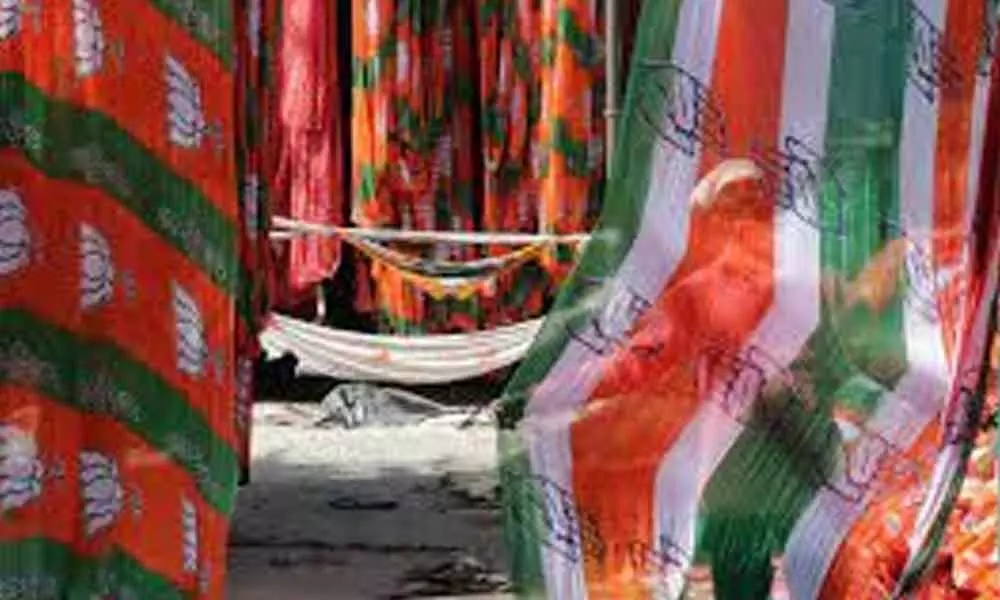Live
- NASA Tracks Five Giant Asteroids on Close Approach to Earth Today
- Pushpa 2 Hits ₹1000 Crore in 6 Days: How It Compares to Other Top Indian Films
- Vivo X200 and X200 Pro Launched in India: Price, Specifications, and Features
- Nitin Gadkari Admits Feeling Embarrassed at Global Summits Over Rising Road Accidents in India
- Comprehensive Review on Indiramma Housing Survey and Welfare Initiatives Conducted via Video Conference
- Jogulamba Temple Records Rs 1.06 Crore Hundi Revenue in 150 Days
- Opposition Slams ‘One Nation, One Election’ Bill as Anti-Democratic; BJP Allies Support the Move
- Celebrate Karthigai Maha Deepam Virtually with Sri Mandir’s LIVE Darshan Experience
- BJP Extends Support to Samagra Shiksha Abhiyan Employees' Strike, Demands Immediate Regularization and Welfare Benefits
- Dr. M. Priyanka Stresses Quality Education, Nutritious Meals, and Cleanliness in Schools
Just In
South India to remain indifferent to national parties


South India to remain indifferent to national parties
If the outcomes of various elections over the past few decades, till the recent Assembly polls in Tamil Nadu and Kerala, are any indication, south of the Vindhyas, the electoral arena remains a minefield for mainstream national parties, read the BJP and Congress.
If the outcomes of various elections over the past few decades, till the recent Assembly polls in Tamil Nadu and Kerala, are any indication, south of the Vindhyas, the electoral arena remains a minefield for mainstream national parties, read the BJP and Congress.
Of the five States that comprise South India, three are ruled by regional parties, one has a Left-coalition dispensation, with only Karnataka having a fragile BJP government uneasily in place.
While the Congress continues to lose prominence across the country, its situation has been particularly precarious down south, long considered its citadel. The slow slide to inconsequence began in Tamil Nadu with the party succumbing to the anti-Hindi stance that continues to this day.
Thereafter, in the eighties, fuelled by filmstar-turned-politician NT Rama Rao's Telugu Pride, the then state of Andhra Pradesh showed the door to the Congress. Post-bifurcation, the party has made way for regional parties in Andhra Pradesh as well as the fledgling state of Telangana. For a change, the Congress has managed to be on the winning side in Tamil Nadu, but it lost the Kerala polls for the second time in a row.
The story is not very different for the BJP, ruling the roost at the Centre, and a host of States in the north, west, and eastern parts of the country. With negligible presence for decades, the south remains a tough nut to crack for the BJP. Although the saffron party did make inroads with successes in Karnataka, it has lost steam and continues to steer a leaking ship through the choppy waters of an unconvincing majority in the Assembly.
Compared to States like Tripura and Assam in the East, the BJP has had a lacklustre performance in Andhra Pradesh and Telangana. While it drew a blank in Andhra Pradesh Assembly polls in 2019, the BJP's graph in neighbouring Telangana has been a bit of a rollercoaster.
Bolstered by its wins in Dubbaka Assembly poll and Hyderabad municipal polls, the BJP is preparing to squarely take on the ruling TRS in the next Assembly election. While Telangana is its most promising arena in the south, the reverses it suffered in Bengal polls should give the BJP some food for thought.
Despite high expectations, the party ended up losing even the sole Assembly seat it had won in the previous Kerala election. To its credit, the BJP has won four seats, making a comeback in the newly-constituted Tamil Nadu Assembly after 20 years. But with a distinctly Dravidian party at the helm, there is little that the BJP can expect to achieve here in the foreseeable future.
So, what really are the reasons for the national parties' lack of traction in the South?
For starters, the southern states have had a strong tradition of throwing up homegrown leaders. From Karunanidhi, MGR, Jayalalithaa, NTR, KCR, and Jagan Mohan Reddy all have built up their vote banks assiduously. All of them are accessible in the vicinity rather than faraway Delhi. In fact, the BJP's success story in Karnataka wouldn't have been possible without Chief Minister B.S. Yediurappa, another homegrown leader.
In the Congress, a culture of subservience to the family has effectively killed local leadership. For the BJP it is a case of not having sufficiently large mass base. Unfortunately for the BJP, the process of building up local leadership is a slow and labourious process that cannot be substituted by wholesale imports from other parties. It needs to plan for a long-term future rather than the immediate future.
The second factor that is a stumbling block in the BJP's expansion plans in the south, has to do with demographics.
Compared to the other three parts, the communal composition is not so pronounced in the south. Therefore, sharp polarisation on religious or cultural lines is not easy.
The Congress has seemingly hit a wall, apparently not a favourite with youngsters who make up the major share of the electorate. According to social scientists, rising urbanisation and education levels have also majorly affected the party's fortunes at the hustings.
Most importantly, it is the presence of a strong local sentiment in each of these states, wary of being swept away by a north Indian wave. This is precisely why regional parties thrive, and pose challenges for the national parties. A trend that is likely to sustain for at least the next few election cycles.

© 2024 Hyderabad Media House Limited/The Hans India. All rights reserved. Powered by hocalwire.com






